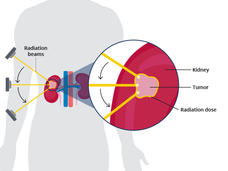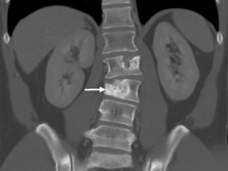October 2023 - Cancer Currents Blog
-
Study Finds Shortcomings in Monitoring Caregivers' Emotional Health
In a survey of more than 100 US community cancer clinics, only 16% routinely screened informal caregivers of their patients for distress. In contrast, more than 90% regularly screened patients for distress and provided referrals to supportive care services.
-
SBRT Emerging as an Important Treatment for Early-Stage Kidney Cancer
Stereotactic body radiotherapy was effective in people with localized kidney cancer who weren’t able to have surgery to remove their tumor, a clinical trial has shown. No patients had their cancer start growing or died from cancer over the next 5 years.
-
Trial Results Confirm Effectiveness of Atezolizumab Against a Rare Sarcoma
Treatment with atezolizumab (Tecentriq) shrank tumors in about 40% of people with alveolar soft part sarcoma, including one complete response, new clinical trial findings show. Some people were later able to stop treatment without the cancer returning.
-
ENLACE Study Explores Colorectal Cancer in Hispanic and Latino People
The ENLACE study is the first to use cutting-edge technologies to describe the molecular features of colorectal tumors in Hispanic and Latino people. The study’s goals are to improve treatments and increase Hispanic/Latino engagement in cancer research.
-
Oncolytic Virus Enables the Immune System to Attack Tumors
A cancer-infecting virus engineered to tamp down a tumor’s ability to suppress the immune system shrank tumors in mice, a new study shows. The modified oncolytic virus worked even better when used along with an immune checkpoint inhibitor.
-
Is AI Ready to Play a Leading Role in Colorectal Cancer Screening?
Using computer-aided detection (CAD) during a colonoscopy doesn’t help doctors find the growths most likely to become colorectal cancer, two studies find. Researchers agreed that CAD, which is aided by artificial intelligence technology, needs further refinement.
-
Can Artificial Intelligence–Driven Chatbots Correctly Answer Questions about Cancer?
Can AI chatbots give people accurate information about cancer and its treatment? The answer appears to be: Not yet. Results from two studies have found that, although AI chatbots can gather cancer information from reputable sources, their responses to questions about treatment and other topics can include errors and omissions.






